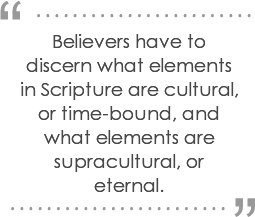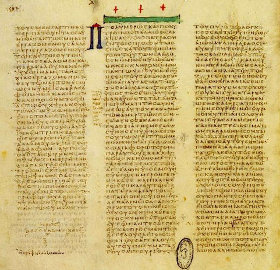Soulforce: "as we have had the Holy Spirit inform us, we have changed our minds on the issues that we thought were [settled] within Scripture"
Body
Discussion
"Evangelicalism is facing a crisis about the relationship of Jesus to Paul, and many today are choosing sides."
Body
Discussion
Is the Meaning of Scripture in Motion?
 Reprinted with permission from Faith Pulpit (July-September, 2010).
Reprinted with permission from Faith Pulpit (July-September, 2010).
An Evaluation of the Redemptive-Movement Hermeneutic
In the summer of 2007 I had the privilege of leading a group of teens from my church on a missions trip to France. A few weeks before the trip, one of the French missionaries we would be visiting (Denise Nelsen, a 1989 FBBC grad), was stateside and was able to come to our youth group to meet the missions team. Before the meeting, I asked her to greet the teens like she would greet French teens at her church—with a kiss! One by one the teens filed into youth group and were greeted by this strange woman with a holy kiss on each cheek. The shocked and surprised faces of the teens were truly a sight to behold!
Whether this humorous exercise helped prepare the teens for France or not may be debated, but it certainly awakened their understanding of the cultural differences between France and Iowa. In many respects this anecdote represents something at the heart of Biblical hermeneutics—the contextualization of Biblical truth. Contextualization is applying or appropriating Biblical truth into a contemporary setting and culture.1
Each time we modern believers apply the Bible, we consciously or unconsciously contextualize its meaning. For example, the command to greet fellow believers with a holy kiss is found five times in the New Testament.2 These five passages all contain the same direct imperative (aspasasthe), yet I know of no Bible-believing church in the United States that greets people with a kiss at the front door. Are American Christians living in disobedience? Are French Christians applying the Bible more accurately? The answer to both of these questions is “No,” because we intuitively understand that greetings change from culture to culture. The Biblical principle at stake is loving hospitality, not the cultural custom of kissing. While this example of contextualization is fairly straight forward, a multitude of controversial issues faces today’s church.
Discussion
Answers from the Whole Bible
 Reprinted with permission from the Baptist Bulletin Sept/Oct ‘10 issue. All rights reserved.
Reprinted with permission from the Baptist Bulletin Sept/Oct ‘10 issue. All rights reserved.
I enjoy talking with children. It’s fascinating to look at life through their lens. To prime the conversation pump when first meeting them, I will ask kids questions such as, What is your favorite subject in school? What do you like to do when you are not in school? and a favorite question, What do you want to do for a job when you graduate? Kids have some common favorite subjects, after-school activities, and employment aspirations. However, it doesn’t require a PhD research grant to realize that kids are different. Some children like to read, some like science, while others are fascinated with history or geography. Some kids like to dabble with mechanics, some prefer sports, while others like music, art, or drama. Kids have indicated to me a multitude of career choices; they want to be nurses, singers, carpenters, teachers, missionaries, doctors, farmers, and, of course, pro basketball players and firefighters!
Certain educators argue for an interest-based approach to education. They design their instructional program around a child’s aptitude or inclination. However, most educators believe that a general education on the elementary and secondary levels, which provides instruction in a wide range of core subjects, equips a student in the long run for life.
Discussion
The Perspicuity of Scripture as Applied to Bible Translation, Part 3
All things being accounted for, the Scriptures are understandable! It is in those terms that we attempted previously (Briefings, August 2009 and December 2009) to state the doctrine of perspicuity or clarity of the Scriptures as applied to Bible translation.
In examining the Scriptures, one soon discovers many aspects that may render them difficult to be understood: linguistic complexities in the process of translating; particular twists of styles; antiquated literary genres; abbreviated language; unexplained historical and geographical inferences; differing cultural practices; unrevealed meaning of names, things, places, events, and concepts; and more. These difficulties can be compounded by the limitations of the reader who may be unsaved, or limited in knowledge of Biblical facts, or lacking in his investment of time and effort to the study of the Scriptures.
Discussion
"Faith in Jesus" or "Faithfulness of Jesus"?
 Reprinted with permission from Doug Kutilek’s As I See It, (May, 2010) with some editing. AISI is sent free to all who request it [email protected].
Reprinted with permission from Doug Kutilek’s As I See It, (May, 2010) with some editing. AISI is sent free to all who request it [email protected].
Discussion
Preservation: How and What? Part 3
Does the Bible teach that God’s people will always be able to point to a particular text1 of the Bible and know that it is the word-perfect, preserved text? Those who believe a particular choice of translations is “the biblically right” option, tend to answer (passionately) in the affirmative. But many who use other translations or simply prefer the KJV are not so sure. Who is right?
Points of agreement
Nearly all involved in the controversy are agreed that God has preserved His Word for us in some sense. Nearly all are agreed as well that Scripture teaches God will preserve forever, somewhere and in some form, every one of the words He inspired and that some believers will always have access to Scripture in some form. God’s ability to use imperfect sinners to perfectly preserve His Word is also not in dispute, nor is the fact that we should accept what the Bible reveals to be true regardless of the claims of the “science of textual criticism” or any “high thing that exalteth itself against the knowledge of God” (2 Cor. 10:5, KJV).
 Read
Read  Read
Read  Read
Read 
Discussion